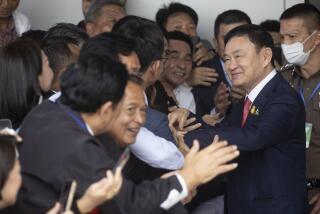Democratization Isn’t an Overnight Process
- Share via
Although the precise mathematical results of the Cambodian election last month remain clouded, the political outcome is clear. A plurality for Hun Sen’s Cambodian People’s Party has been declared by the National Election Commission and informally acknowledged by much of the international community, despite continued allegations and perceptions of electoral abuse.
The task before Hun Sen now is to determine which, if any, of the leading opposition figures can be drawn into a coalition to satisfy the constitutional requirement that the government reflect a two-thirds majority of parties holding seats in the National Assembly and to persuade the West that sufficient power-sharing has occurred. Thus far, the opposition has resisted any such arrangement. Until a new government is formed, the international community remains in a state of suspended animation over Cambodia.
But even without a formal resolution, the election and resulting deadlock offer critical lessons for the international community and U.S. policy:
* Democracy is seldom obtained by international agreement. The 1991 Paris peace agreement on Cambodia was undoubtedly successful in reshaping diplomatic relations in Southeast Asia, severing ties between China and the Khmer Rouge as well as between Vietnam and the Cambodian People’s Party. It paved the way for the Assn. of Southeast Asian Nation’s transformation from a noncommunist bloc to a meeting ground for a wide spectrum of political systems. It encouraged Japan to take a more proactive approach in helping to mediate the region’s conflicts.
But genuine democratization is an internal process, driven by domestic rather than external pressures. International negotiations often encourage incumbents to agree to elections for less than democratic reasons: to enhance their legitimacy on the world stage or to further consolidate their power by manipulating the process through authoritarian means.
* Democratization cannot substitute for conflict resolution. The greatest flaw in the Paris peace process was the failure to resolve the internal Cambodian conflict before attempting political reform. Ironically, the process proved more successful in marginalizing the Khmer Rouge, which had opted out, than in resolving tensions among the signatories. Left intact were two partisan armed factions, tied either to Hun Sen or to Prince Randariddh, barely coexisting under the guise of a national military. Future attempts to encourage democracy in Cambodia must address the need to depoliticize the armed forces.
* Political change must not focus on the national level to the detriment of grass-roots democracy. The enduring Tip O’Neill maxim--”all politics is local”--points out the fundamental problem for democracy-building in Cambodia. International attempts to promote change have favored a top-down approach, aiming to democratize the national levels of the executive and legislative branches. This plan has been thwarted by a grass-roots political system that more closely resembles pre-1991 Cambodia and concentrates power in the hands of the CPP. Local elections planned for 1999 promise to be at least as important for Cambodia as national polls. They offer the chance to alter the dynamics of local leadership and to replace lingering authoritarian officials.
* In the early stages of democratization, flawed elections should be expected, but not sanctioned. Individual elections may be engineered from the outside, as the 1993 Cambodian election was, but it is impossible for external actors to dictate the development of a political culture that guarantees a permanent democratic process. That is achieved over a protracted period of trial and error, involving political reformers, incumbent holders of power and the forces of civil society.
* The U.S. should support the growth of civil society in Cambodia as a way station to democracy. In believing that the Paris agreement could deliver an instant multi-party democracy in Cambodia, the international community seeks the perfect while ignoring the good. Too often, donor attention and funds are tied to unrealistic expectations for the pace of democratic change. Disillusionment with the election risks obscuring the one clear success story in Cambodia since 1991, the development of civil society organizations that have created a credible demand for democratic change. These organizations are the single best hope and insurance for eventual democracy. Protecting and strengthening them should remain a priority for the U.S., whatever the outcome of the 1998 elections.
More to Read
Sign up for Essential California
The most important California stories and recommendations in your inbox every morning.
You may occasionally receive promotional content from the Los Angeles Times.













